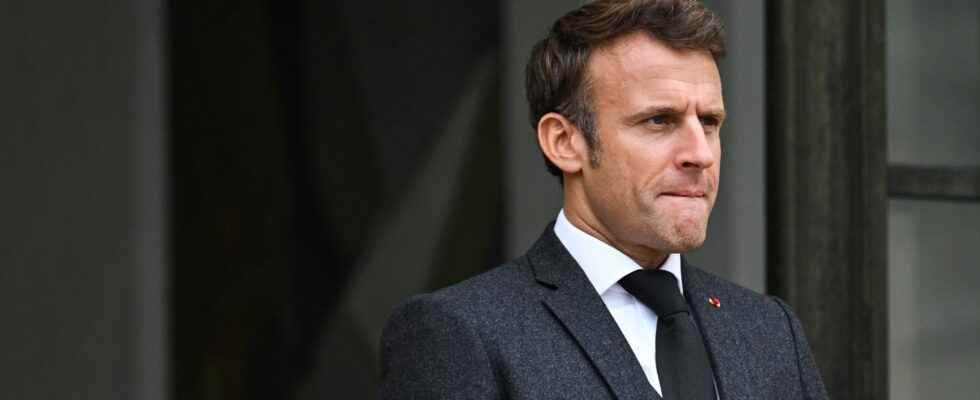They could have used the event as a stage, to show the discontent that runs through the profession. But the bakers will not have gone that far. This Thursday evening at the Élysée Palace, on the occasion of the traditional Epiphany galette ceremony, the National Confederation of Bakery-Pastry finally let Emmanuel Macron take up the subject, oh so burning, of the explosion of electricity prices in the sector. At the start of 2023, a number of 33,000 companies are waking up with a hangover. A new year, synonymous with the entry into force of new electricity contracts, with electricity bills at the price doubled by two, three, up to twelve for some bakers, forced to draw the curtain.
The concern is shared right up to the top of the executive, which knows only too well the political symbol that bread takes on in the country and obviously fears a new social uprising. On January 3, the National Rally did not miss the opportunity to exploit the soaring prices, with a “Letter to the bakers of France” signed by the president of the party, Jordan Bardella. On the executive side, it must be shown that bakers will not be left on the side of the road. Automatic shock absorber of 20% on prices, one-stop shop extended for 2023, postponement of the payment of taxes and social security contributions… It would be unfair to say that the government is turning a deaf ear. But as synthesized by a craftsman this week at CNEWS, there is an air of “bandaging on gangrene”.
When it comes to electricity bills, the disease is likely to be contagious. Thursday again, the restaurateurs were received at the Elysée. They called for the establishment of regulated tariffs. Then will come the turn of craftsmen and generally, all VSEs-SMEs, which will see their costs increase significantly from January. Then it will be the turn of individuals, at the beginning of February, with the 15% increase in regulated sales tariffs (EDF’s blue tariff), which is combined with the end since the beginning of the year of fuel discounts , replaced by more targeted but nonetheless less substantial aid.
The social pressure cooker
Bread and gasoline … an explosive cocktail, likely to overflow the social pressure cooker, at the very moment when the government is embarking on the thorny project of pension reform. These increases are obviously the consequence of an energy context which is still extremely tense, as well as the easing of a tariff shield which is very costly for public finances. “The State is not intended to bear all the additional costs” linked to the increase in energy prices, justified this Friday Olivier Véran, judging that by continuing to subsidize, the State also fed the inflation monster. The public deficit, which exploded in 2022, and the sustained rise in interest rates, are also powerful agents in favor of this relaxation. No more “whatever the cost”, place for “help adapted at the right time and to those who need it”, indicated the government spokesperson on BFMTV.
And as often when it can no longer, the State asks others to take over. In the case of soaring electricity prices, the natural belt constitutes the energy providers. This week, they got their ears pulled. They would not play the game, would take advantage of the situation to redo the icing, we hear more or less openly from Bercy to the Elysée. At the beginning of the week, Bruno Le Maire explained that he would not hesitate to give the names of the actors who did not play the game. The Minister of the Economy also raised the specter of additional levies on the profits of the latter. Denouncing in a martial tone the actors who take advantage of the crisis this Thursday, Emmanuel Macron hammered home that all craftsmen or small businesses having “negotiated excessive contracts” could “renegotiate” their contract in January to bring them closer to the target of 280e/MWh, reference price given by the Energy Regulation Commission.
In the camp opposite, received this Friday at 4 p.m. in Bercy, concern naturally prevails. If some have sometimes tried to take advantage of the current crisis with unscrupulous practices, it would be excessive to rank the profession among the winners of the current crisis. More than a dozen suppliers have lowered their flag since the end of 2021. The current drop in prices on the wholesale markets, due to an abnormally mild winter and sudden or voluntary reductions in consumption, is not a sign significant profits for suppliers.
Suppliers, crisis profiteers?
Most of them entered into contracts with companies and bought the corresponding volumes of electricity between the summer and November, when prices were particularly high. By forcing them to break contracts and renegotiate at much lower levels in January, they expose themselves to significant losses. “To ask for such a renegotiation of the contract is very surprising. We would like to force a consolidation of the market by transferring the small suppliers that we would not have done otherwise”, explains an energy broker to us.
The case of large producers integrated suppliers, such as EDF, Engie and TotalEnergies is obviously different, even if the first has to deal with the endemic weakness of its nuclear production and an abyssal debt. The enormous profits made by the other two in 2022, with the explosion in the price of gas and the increase in oil, undoubtedly authorize some gestures, or at the very least an effort of negotiation with their customers to pass the storm. Enough to calm the discontent and an outbreak that is spreading like wildfire throughout French society? Obviously not.
